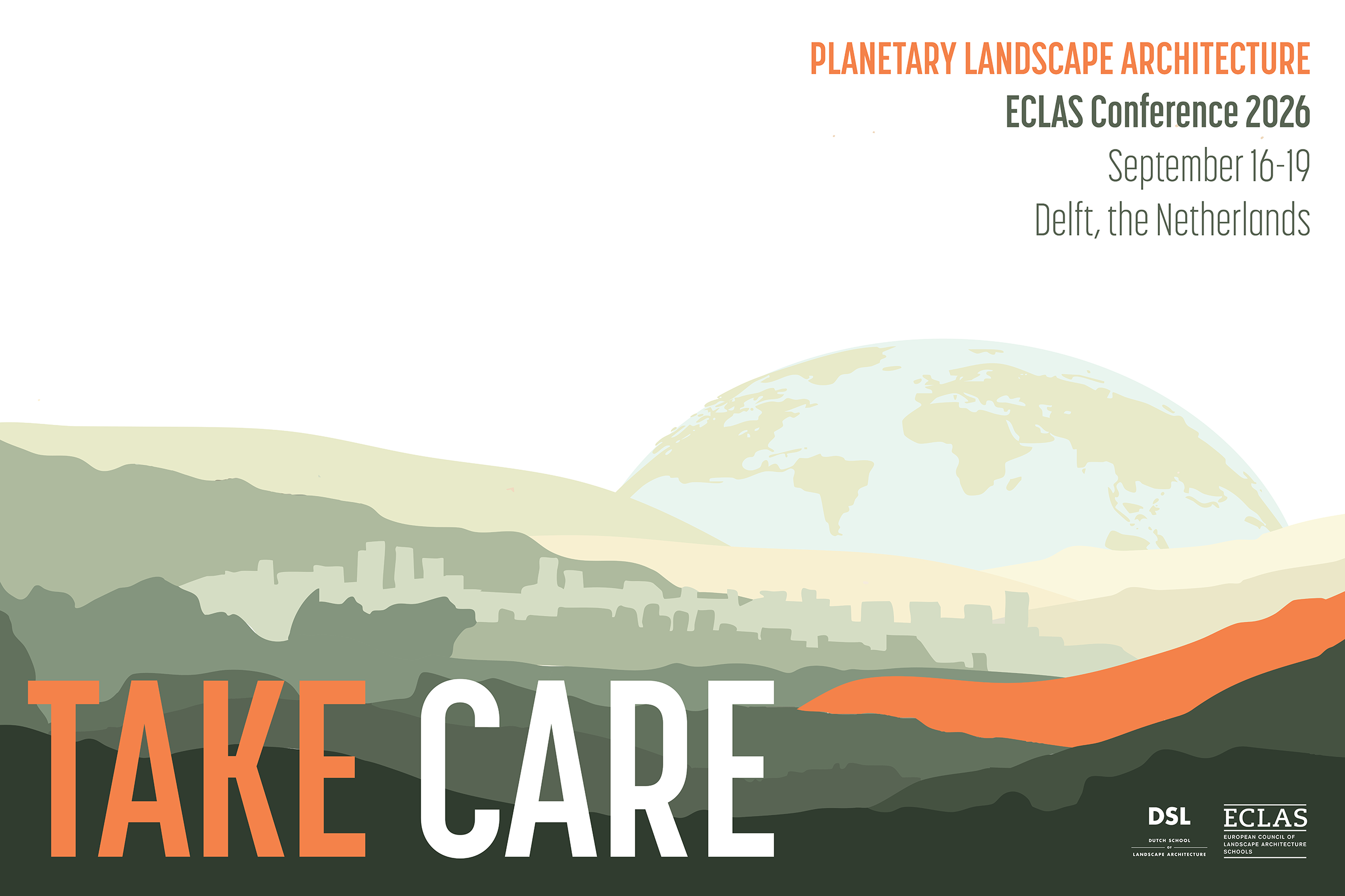ECLAS 2026 Take Care – Planetary Landscape Architecture

We are pleased to invite you to the next edition of the annual ECLAS conference which will be held at the University of Technology Delft, from 16 to 19 September 2026, organised by DSL.
The 2026 theme is ‘Take Care – Planetary Landscape Architecture’. In an age of ecological and environmental urgency, landscape architecture must be more than the design of space — it must become a practice of care. Take Care calls for awareness, responsibility, and action. It considers the limits of planetary systems, assuming responsibility for human interventions, and using the power of design to shape landscapes that support life. It operates at a planetary scale, but also regionally and locally.
Take Care is structured around five interconnected tracks — each offering a pathway for a knowing and doing in a planetary age. We invite contributions on theory and discourse, on ways of knowing and doing, on emerging perspectives and voices, on planetary challenges, and on transformative education. Together, they form a framework for a profession that is ethically engaged, relationally aware, and equipped to foster a regenerative future for the planet.
To foster a maximum level of learning, interaction and action around the conference theme, we invite both regular paper contributions as well as alternative contributions in formats such as visual essays. The two formats also inform the structure of the conference: day one is to be a ‘dissemination day’ for regular contributions while the alternative contributions are the input for an ‘exchange day’ on day two.
Conference Theme: Take Care – planetary landscape architecture
In an age of ecological and environmental urgency, landscape architecture must be more than the design of space — it must be a practice of care. Take Care calls for awareness, responsibility, and action. It considers the limits of planetary systems, assuming responsibility for human interventions, and using the power of design to shape landscapes that support life — at a planetary scale, but also regionally and locally, both ecologically and socially.
Transitioning to a practice of care is about a new stewardship of the land, shaping landscapes with regard for the interconnectedness of things, and about scales of action from the global to the regional to the local to the microbial. Today we have unprecedented insights into the planet’s intricacies, and with that knowledge comes responsibility — and an urgent call to Take Care. We need to review our ways of knowing and doing, expand the foundations and agency of the discipline and widen our horizon through trans-disciplinary practice.
Through education, research, and design practice, Take Care explores how landscape architecture can collaborate with nature and respond to societal challenges. It promotes attentiveness, inclusivity, and long-term commitment, while embracing diverse perspectives, fostering equity, and recognizing the deep interconnection between environmental and social systems. At its core, Take Care affirms the power of landscape architecture to navigate these complexities and contribute to a meaningful, fair and resilient future. For in landscape there are no real boundaries — the Earth has always been a connected whole.
Take care.
Take into account.
Take responsibility.
Take action.
Design for life.
Five Tracks of Care in Landscape Architecture
Landscape architects are stewards of the land, shaping space while taking care of the planet. Turning these principles into practice, Take Care is structured around five interconnected tracks — each offering a pathway for landscape architecture in a planetary age. These tracks explore how care can be enacted through theoretical grounding, methodological innovation, inclusive dialogue, design responses to urgent challenges, and transformative education. Together, they form a framework for a profession that is ethically engaged, relationally aware, and equipped to foster regenerative futures.
I – Taking Care by Reframing Our Worldviews
Theory | Discourse | Ethics
This track explores the foundational ideas that shape how we understand and engage with landscapes in a time of planetary crisis. From rethinking the Anthropocene to embracing infrastructures of care, it examines frameworks that position landscape architecture as a relational practice — one that acknowledges interdependence between humans, non-humans, and the Earth system. Here, care is a philosophical and political commitment to designing with humility, accountability, and respect for planetary limits. This track also invites contributions on topics such as planet systems thinking, land ethics, human-nature relationships, entangled knowledge, regeneration and agroecology.
II – Taking Care through Design Methods and Tools
Methods | Tools | Techniques
Designing for life begins with how we observe, interpret, and intervene. This track focuses on ways of knowing and doing of landscape architects as caretakers — and ‘caregivers’ — of planet-sensitive landscapes. It invites innovations in our current mapping, modelling and landscape representation techniques, but also in new methodologies that draw for instance on traditional and indigenous practises. Planet-sensitivity also provokes combining disciplinary knowledge and developing hybrid methods that connect analytical, experiential, and creative knowledge — from fieldwork to digital innovation using XR and AI. It also elicits new tools that centre relationships rather than objects, enabling designers to work with complexity and uncertainty while cultivating practices of care and precision.
III – Taking Care by Engaging Diverse Voices
Perspectives | Voices | Actors
Landscapes must be inclusive to be resilient. This track fosters elaborations of landscape architecture practices shaped through dialogue, participation, and shared authorship. The design of new actor networks is also the focus of this track, as are new forms of practice such as multi-species perspectives, indigenous knowledge systems, feminist approaches, and emerging voices that challenge dominant narratives. Care here means making space — for more-than-humans, for diversity, by incorporating novel ways of knowing. Contributions from both process-based thinking and morphological approaches are welcome.
IV – Taking Care in the Face of Urgent Transitions
Topics | Challenges | Approaches
From climate adaptation to urbanization, from circularity to biodiversity loss — this track addresses the pressing challenges where landscape architecture can make a transformative difference. It explores how design can respond to complex problems through design-technical and situation-specific solutions, but also engages social, cultural and ecological complexity. Landscapes of care are not just solutions, but living systems that support health, well-being, and regeneration in the long term. This track invites contributions that address challenges such as biodiversity loss, heat mitigation, drought and flood resilience, the energy transition, and circularity. Approaches to a planet-sensitive design culture such as landscape-based urbanism, eco and bio-cities and forest urbanism are also welcomed.
V – Taking Care through Transformative Education
Education | Pedagogies | Didactics
What does it mean to educate landscape architects in the context of planetary challenges and the paradigm of care? This track explores landscape architecture as a pedagogy of care — from participatory studio formats to intercultural learning and professional renewal. It invites work that equips students with competencies to generate alternative models of beauty and performance in an age of ecological and environmental urgency, prompting contributions that empower future designers with the mindset, sensitivity, and tools to work with uncertainty and complexity, fostering collaborative and ethical practices that support sustainable and fair futures.
Conference Details
Venue: Faculty of Architecture and the Built Environment (A+BE) TU Delft, Julianalaan 134, Delft, Netherlands and Lijm & Cultuur lab, Rotterdamseweg 272, Delft.
Format: The conference will include both in-person and virtual participation options.
Conference dates: Wednesday 16 September to Saturday 19 September, 2026.
Other important dates:
31.10.2026: Call for abstracts opens, see conference.eclas.org for details
31.01.2026: Deadline call for abstracts
01.02. – 15.03.2026: Review process
16.03.- 30.03.2026: Announcement of acceptance
01.04. – 15.06.2026: Revised (extended) abstracts and visual essays submission
01.04.2026: Registration opens
31.05.2026: Registration deadline for presenters
31.07.2026: Registration deadline for non-presenting participants
Conference Programme
Wednesday 16 September, 2026: PRE-CONFERENCE DAY + OPENING
All-day registration
PhD doctoral colloquium
Heads of Schools meeting
Official opening and keynotes
Informal dinner
Thursday 17 September, 2026: DISSEMINATION DAY
Presentations in parallel sessions
Keynotes
Official dinner and award ceremonies
Friday 18 September, 2026: EXCHANGE DAY
Parallel exchange sessions within tracks
Parallel exchange sessions across tracks
Plenary, formulation of call-to-action
ECLAS General Assembly
Afterparty
Saturday 19, 2026: EXCURSIONS & ACTIVITIES
Thematic tours
Project and location tours
Workshops / design sessions
Peer-to-peer meetings
For more information and registration, see conference.eclas.org
